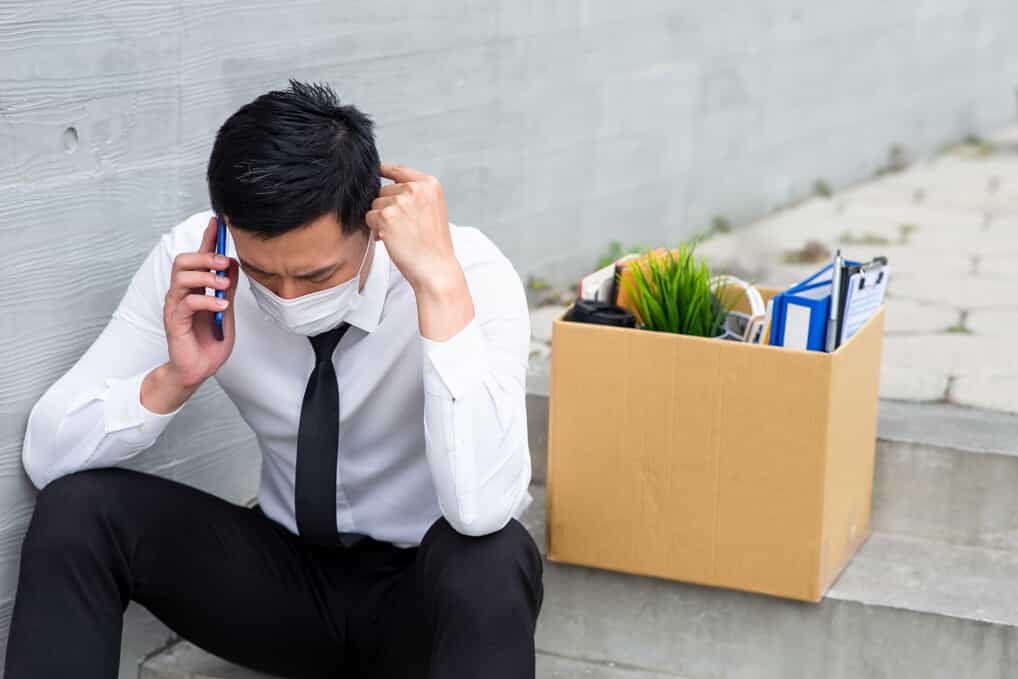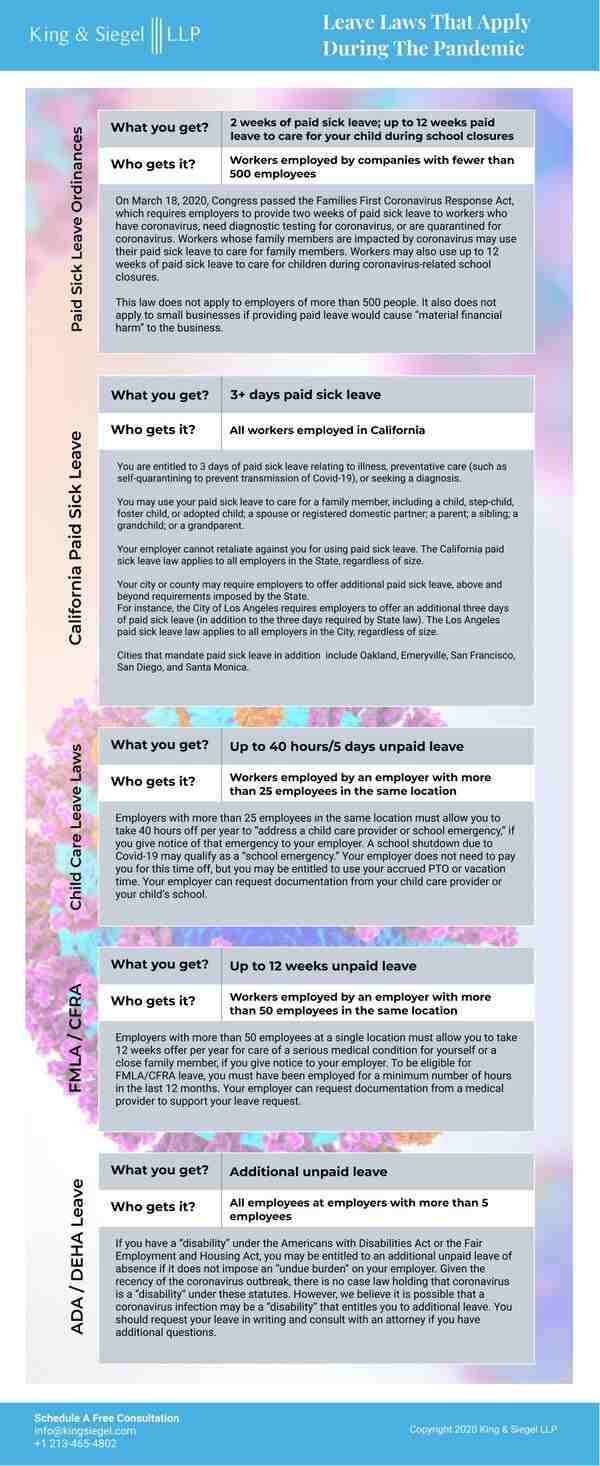


The coronavirus outbreak has changed the employment landscape. Workers face new problems dangerous to their personal health like being asked to report to work in violation of a stay-at-home or shelter-in-place order; being asked to work in close proximity with other workers in violation of social distancing recommendations or orders; or being asked to work without necessary protective or sanitary equipment, such as gloves, masks, or sanitizing liquids.
These problems are new, and the answers are few and far between. We are here to help. Here are some common questions we were asked during the first week of this national emergency.
Please keep in mind that new laws are being written daily to address the problems of working people during this unparalleled crisis. You should contact us for the most up-to-date information about the current state of the law.
Q. I’m being asked to report to work in violation of a stay-at-home order. Can my employer fire me if I refuse to come in?
A. Unless your employer is an “essential” business, your employer is probably not allowed to fire you for refusing to physically report to work during a stay-at-home or shelter-in-place order. Even if your employer is an “essential” business, if your work is not essential or cannot be reasonably performed at remotely, you still may have a right not to show to work in person.
The general rule is that your employer cannot fire you for refusing to violate “well-established” public policy, which includes statutes, regulations, emergency orders, and other sources of law. This means that, if you are fired for refusing to come to work in violation of a shelter-in-place order, you probably have a claim for wrongful termination in violation of public policy.
If you find yourself in this situation, make sure you tell your employer in writing that you are not coming to work because of the stay-at-home or shelter-in-place order. Identify any personal reasons why you should not come in as well: for example, if you may have been exposed to the coronavirus, if you are awaiting test results, if you are immunocompromised or live with someone who is, if you believe your employer is not providing safe social distancing at the worksite, etc. Keep a detailed record of your interactions with your employer relating to these issues.
What if your employer is an essential business? Are you required to come in to work? The answer is: it depends. If you have a medical condition that makes it high-risk for you to potentially expose yourself to the coronavirus by working, you may have a medical reason to stay home, and your employer may be required to accommodate you. If you request leave because your children are out of school, and your employer retaliates against you, you may have a claim under the leave laws explained below. You should contact an experienced employment attorney at King & Siegel LLP for more information on your specific circumstances.
Q. I’m being asked to work and am not being provided with necessary protective or sanitary equipment. Can I refuse to come in? Can I force my employer to give me the necessary equipment?
A. This is much trickier. The same rules as above apply: your employer cannot fire you for refusing to violate “well-established” public policy, which includes statutes, regulations, emergency orders, and other sources of law. Depending on your field of work and the applicable rules and regulations, there may be requirements that you work with adequate personal protective equipment; if there are such rules, and you are fired, demoted, disciplined, etc., for refusing to break them, you may have a claim for wrongful termination in violation of public policy.
In addition, healthcare workers specifically have protections when they are a “whistleblower” regarding patient care, services, or conditions at hospitals and certain other health care facilities. This now includes concerns about patient and personal safety with respect to the coronavirus. Healthcare workers who raise concerns about patient care, services, or conditions cannot be retaliated against by an employer. However, you may be required to continue doing your job.
Q. My kids are out of school indefinitely, and my daycare is closed. What kind of leave am I entitled to? Can my employer fire me while I’m on leave?
A. If you work at a worksite with more than 25 employees, California law entitles you to five days or 40 hours of unpaid leave due to a “child care or school emergency, if you give notice of that emergency to your employer. You cannot be terminated, demoted, retaliated against, etc., for taking leave, requesting leave, or refusing to work during leave. You are also entitled to paid sick leave through California law and (sometimes) local ordinances. These leave laws are explained in the chart below.
In addition, the federal Coronavirus Response Act provides for paid sick time of up to $511 per day, until you have collected $5,110, if your employer employs fewer than 500 people. The Secretary of Labor is required to issue guidelines regarding the interpretation of this new law by April 2, 2020. Right now, it appears that this statute will also cover school emergencies, including caring for a child who cannot attend school or daycare.
Q. My hours have been cut and I can’t pay my bills. Can I collect unemployment even though I still have a job?
A. Probably. On March 12, 2020, Governor Gavin Newson waived the one-week waiting period for workers applying for unemployment or disability benefits as a result of COVID-19. This means that, if you are unable to work because (1) you are laid off or your hours are cut due to COVID-19 or (2) because you personally are ill or quarantined, you may be eligible for unemployment or disability benefits by applying through the California EDD. More information is available here.
Q. My family member is sick and now I have to quarantine as well. Can I get paid family leave benefits through the state?
A. If you are unable to work because you are caring for a family member who is ill or quarantined due to COVID-19, you may be eligible for paid family leave (“PFL”) benefits through the EDD. You will need a certification that your family member is ill or quarantined, including the diagnosis, a statement of symptoms, the start date of the condition, its probable duration, and a treating physician’s license number or facility information. A public health official’s written order to self-quarantine is also sufficient to apply for PFL benefits. Additionally, if you work for an employer with at least 50 employees at a single location, you are entitled to take up to 12 workweeks of unpaid, job-protected leave to care for yourself or a close family member. To be eligible for this leave, you must have been employed for a minimum of 1,250 hours in the last 12 months.
Q. My employer is making comments about my race because my family is from China, Italy, etc. or is assuming that I am infected because I am from a country with high infection rates. What are my rights?
A. It is always illegal for employers to discriminate against or harass employees based on their race, national origin, or perceived or actual disability. If your employer is harassing or discriminating because you or your family is from a country with a serious coronavirus outbreak, you may have a claim for harassment. You should contact us immediately if you believe you are being discriminated against because of your background, race, or perceived status of having the virus.
Q. I was infected and put under quarantine but my employer has indicated they will not let me come back to work until this crisis is over, even if I am better. What are my rights?
A. You probably have a right to reinstatement, and your employer is almost certainly breaking the law if you have been cleared to return to work by a doctor. Your status as someone who had coronavirus is likely a “perceived disability” and you are protected from discrimination under the California Fair Employment and Housing Act.
Leave Laws That Apply During the Pandemic



